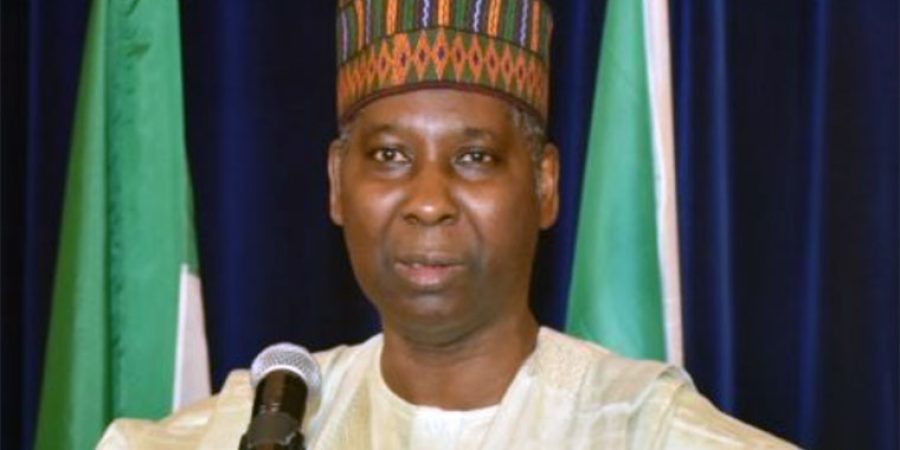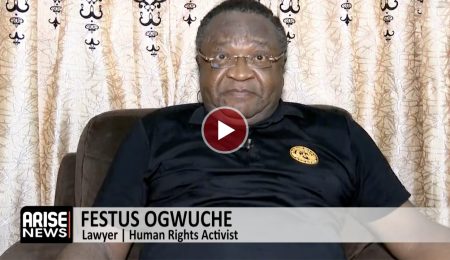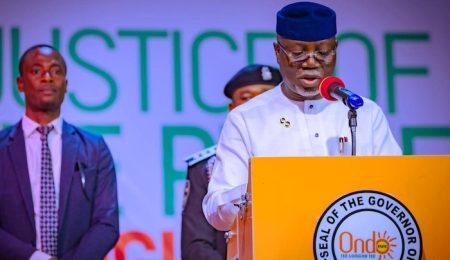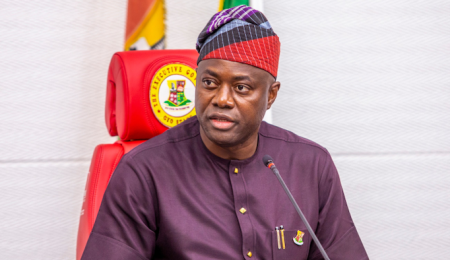Professor Muhammad Tijani Bande , former Nigerian Ambassador to the United Nations and President of the United Nations General Assembly spoke truth to power, noting that with 2/3rd of Nigeria’s population, three quarters of the land mass and 64% of Northern votes in favour of President Bola Ahmed Tinubu they have concerns that need urgent action.
The President on Tuesday fought back the growing opposition from the northern part of the country as the 2027 elections approach, deploying over 60 top government officials, including ministers, heads of security agencies from the region, special advisers, heads of parastatals, among others, to address their grievances.
The North has been unhappy with Tinubu since assuming office in May 2023, with massive support from the region. It is now flaunting its commanding landmass of the country, huge population and massive voting numbers to drive home its opposition to the President’s re-election.
It certainly can make or mar the presidential hopes of any candidate and it is roaring and flexing its electoral muscles.
Tinubu certainly realises the importance of the North to his electoral fortune and is throwing everything in the fight to get the support of critical stakeholders from the region as the race for 2027 gathers momentum.
The representatives of the president at the event, who sought to convince the leaders of the region on what the Nigerian leader was doing to lift the region from the current insecurity, poverty and other social vices, stated that no other Nigerian leader has looked out for the interest of the region in recent times the way Tinubu has done since 2023.
It was also a time for some ‘home truths’, as the leader of the presidential delegation, the Secretary to the Government of the Federation (SGF), Senator George Akume, urged the region to defer their aspiration for 2027 and wait for 2031 in the interest of the unity of the country.
The National Security Adviser (NSA), Nuhu Ribadu, also took his time to enunciate measures so far taken by the federal government to end the insecurity in the north, arguing that while the Tinubu administration met a very bad situation, it has gradually pushed back on the insecurity in all parts of the country.
As the political tempo begins to build ahead of Nigeria’s 2027 general elections, several key figures from the north and within the ruling political elite have recently emerged as strong opponents to Tinubu’s re-election bid.
Among them, the most vocal have been a former Kano Governor and New Nigeria Peoples Party (NNPP) leader, Rabiu Kwankwaso, who has accused Tinubu of neglecting the region; former Secretary to the Government of the Federation, Babachir Lawal; and ex-Kaduna State Governor, Nasir El-Rufai.
While mobilising others, they have brought different strands of growing resistance to Tinubu’s presidency, citing regional discontent and neglect. They have tried to play up the perceived growing sense of political and economic marginalisation since Tinubu assumed office.
Some key political players in the region believe that the Tinubu administration has not maintained the traditional political balance that ensured the North’s strategic interests were protected within Nigeria’s power-sharing framework. Appointments to key government positions, some elites from the region have argued, have been skewed, sparking dissatisfaction among influential northern political and religious figures.
Beyond appointments, there is also resentment over the impact of Tinubu’s economic reforms on the northern masses, including the removal of fuel subsidies and the floating of the naira, which have driven up the cost of living, hitting the informal economy on which many northern Nigerians, a large voting bloc, depend.
Speaking at a town hall organised by the Sir Ahmadu Bello Memorial Foundation to assess Tinubu’s midterm as Nigeria’s leader, the SGF who led the president’s delegation, told the north to wait for its turn, insisting that although unwritten, there’s now an agreement that each region between the south and the north should have eight years each.
The event was themed: “Assessing Electoral Promises: Fostering Government-Citizens Engagement for National Unity”.
Akume said: “It is good to give honour to whom honour is due. If a leader does something that is commendable, we must, as citizens, commend him so that he can do more. When he makes a mistake, he’s not God. He should be gently reminded to take corrective measures. I’m saying this because there has been a lot of misinformation in the political space about appointments.
“But when I ran the statistics, in April, the south-west was leading, followed closely by the north-west, then the north-east, north-central, south-south, and then south-east. So when we speak, we should be guided by facts, not sentiments. This country belongs to all of us. Anything that would disturb stability and equilibrium should be avoided.
“It does us no good. There are certain issues I’ll be taking up with a select few. I wouldn’t want to expose them here as to why we believe we should do everything to ensure the territorial integrity of our country. Those of us from this part of Nigeria, he has promised Nigerians impartiality in governance and a commitment to remodeling our economy, improving security, accelerating infrastructure, job creation, and revitalising agriculture.
Listing the several initiatives by the Tinubu administration to lift Nigeria from its present state, Akume noted that the president has adopted bold and foundational reforms to stabilise and grow the Nigerian economy, including a unified exchange rate, removal of fuel subsidy and the reform of the tax system.
Among others, he stated that the government continues to invest massively in the acquisition of modern technology and equipment, as well as upscaling of skills of members of the armed forces to minimise insecurity. “Last year alone, diaspora remittance to Nigeria was $22 billion,” he added, highlighting the impact of Tinubu’s reforms.
With the removal of subsidy, he stated that the savings are now being redirected into critical infrastructure and human development while states as well as local governments are receiving increased allocation.
Talking about 2027 politics, he argued that as a collective resolve to protect and defend Nigeria’s democracy, Nigerian leaders in Kaduna in 1999, before the Jos Convention of the Peoples Democratic Party (PDP) agreed to ensure a north-south power sharing arrangement.
“They recognised, and rightly so, that the only way to ensure the unity and territorial integrity of our dear country was to entrench in our minds and practice rotational presidency between the south and the north. I salute their courage, sincerity, and patriotism,” he stated.
He listed 18 Nigerian leaders who took the decision to ensure the unity of Nigeria, recalling the June 12 challenges and how the country made a decision to allow the south-west to govern the country after the demise of Moshood Abiola.
“We argued for over three hours. Then finally, with superior reasoning from these people, we agreed that after four years for the south, then back to the north, but later it was increased to eight in the south, eight in the north, so everybody will feel part of this country.
“Their wisdom has paid off. This arrangement guarantees stability of the polity. The north will be eligible for the presidency in 2031, not 2027. I said this because I love you. We love all of you. Let us not do something that will undermine our territorial integrity and tomorrow people may be tempted to support others against us. Nigeria will not cease to exist. But we need patience to arrive at our turn,” Akume stated.
He added that the belief that Tinubu’s policies are more aligned with the interests of the south-west elite than with the broader needs of the country, especially the north, was baseless.
In his intervention, the NSA, Ribadu, listed the achievements of the Tinubu government in the area of security, noting that now, Nigerians, especially people from the north can move around unlike before Tinubu took over.
“President Tinubu told us to come and present ourselves before you, and we are here. And to also once again give you the assurance that Nigeria is in good hands, that we will work, that we will restore order, we will bring stability to our country, we will give our people their lives back”, Ribadu said.
Ribadu, alongside, heads of security agencies in the country in a major highlight of the two-day event, made a solemn pledge to end insecurity nationwide, listing the giant strides already achieved in the Niger Delta and in the south-east.
“We stand before you to give you this commitment, that we assure you that Nigeria is in good hands, and we will restore order. It’s a commitment. But at the same time, we ask for your patience. We ask for your support. We need your support. We need to do it together as one. But take it from us that we will deliver this assignment,” he stated.
He listed the attacks on Brigade of Guards under Muhammadu Buhari, attacks on train passengers, and the attacks on prisons in Abuja as some of the major incidents that happened before Tinubu took over, stressing that though the criminals continue to try, their attempts are being thwarted by Nigerian security forces.
In his intervention, the Chief of Defence Staff (CDS), Gen. Christopher Musa, noted that Nigeria has moved from where it was in terms of the fight against insecurity, maintaining that with collaboration with neighbouring nations, Nigeria was winning the war.
“Since the assumption in 2023, the Armed Forces of Nigeria and other security agencies, based on presidential directives, through a strategy of jointness…has clearlydefined leadership concepts that are hinged on professionalism, jointness, people-centrism, and collective actions.
“We understand that as security agencies, wherever we are protecting, if the people are not happy with what we are doing, then we are not succeeding. And so, whatever we want to do, we have told our commanders, they must ensure they carry the people within the communities, they must protect them. It is not to harm anybody. We are only after the bad guys,” Musa stated.
He added: “We are doing everything possible to ensure that we position our men properly so that they can react. With a land size of over 923,000 square kilometers, Nigeria is massive. With our population, with our strengths, we cannot be everywhere.
“But we have Nigerians all over. And that’s why it’s important for every Nigerian to also be part of the security architecture. Whatever you see that is wrong, please don’t hesitate to report so that actions can be taken.”
Chairman of the Board of Trustees (BoT) of the Arewa Consultative Forum (ACF), Alhaji Bashir Dalhatu, in his remarks, accused Tinubu of sidelining the north despite the massive support he got from the region during the 2023 elections.
Dalhatu recalled that on October 17, 2022, an interactive session was held in Kaduna with presidential candidates of leading political parties including Tinubu, who made promises to address the challenges facing the north.
“In that meeting, we presented to Asiwaju Bola Tinubu, a written address containing details of the issues of urgent concern to the people of Northern Nigeria. In turn, he gave us his own written document containing details of the issues he believed were of concern to the north and how he intended to address them…” he said.
Dalhatu said northerners went out in their numbers on February 25, 2023, and cast their ballots for Tinubu. According to him, 5.6 million out of the total 8.8 million votes garnered by Tinubu in the election were from the north.
“And yet, two years into the four-year tenure of President Tinubu, the feeling among the people of the north is, to put it mildly, completely mixed. To our surprise, those who did not support him, did not vote for him and hardly wished him well, have emerged from nowhere and are trying to push a wedge between him and the north.
“Whether or not they are succeeding, we do not know. But we can not pretend not to observe that President Tinubu’s budget priorities, his infrastructural projects, his appointments, and other executive actions have, over the last two years, largely sidelined northern Nigeria”, the ACF BoT chairman said.
He accused the president of allegedly doing little or nothing to address the major issues of concern to the north.
Dalhatu said the biggest challenge facing the north, is insecurity, pointing out that “Over the last decade, widespread violence, characterised by massacres, bombings, cattle rustling, kidnapping and other manifestations of conflict and insecurity has swept across Northern Nigeria, crippling almost all productive economic activities and social progress”.
He added: “Even as we speak, this crisis shows no signs of abating. The insurgent groups continue to multiply, their attacks becoming more deadly. With the possible exception of Kaduna and Bauchi states, the terror level everywhere in the North has continued to rise with each passing day”.
Dalhatu said unless the government takes decisive, strong, audacious and sustained measures, including the ones that address its root causes, particularly joblessness among the youth and deepening poverty, the insecurity crisis in northern Nigeria will not be contained.
He said that Tinubu needs to demonstrate to the northern public that he is truly concerned with the raging conflict and is determined to bring it to an end.
“The federal government’s budget priorities, infrastructural projects, investments and even social services have been openly skewed against northern Nigeria. This discriminatory practice is not done secretly, it is splashed directly into our face – openly and frankly and without the need for apology,” he said.
According to him, an unhealthy mixture of sectionalism, partisanship and cronyism has followed most of Tinubu’s actions and policies.
“It is true in policy decisions as it is true in appointment and deployment of personnel in the departments of the federal government. Over the last two years, since President Tinubu has been in power, the ACF has released a number of press statements criticising some of his actions or lack of them.
“But we have also acknowledged and commended some decisions we felt would serve Nigeria well. Clearly, our criticisms are not borne out of mischief,” he added.
Also speaking, the Governor of Kaduna state, Uba Sani, who hosted the event, observed that Tinubu has done well for the north, explaining that electoral pledges are not campaign rhetoric to be conveniently forgotten after votes are tallied, but solemn covenants, expression of aspirations, hope, and obligation.
“Two years ago, this foundation brought before you leading presidential candidates, among them His Excellency Aswaju Bola Tinubu. He addressed you not with empty praises, but with vision, a renewal of integration, and rapid development, especially for Northern Nigeria.
“The question is unavoidable. Has President Tinubu honoured the pledges he made? As the governor of Kaduna State, former senator, and a proud son of the north, I offer this response not from a point of political partisanship, but as one engaged in the journey of regional transformation.
“Yes, since assuming office as president and commander-in-chief, His Excellency Bola Tinubu has doggedly kept faith with the north. Yet, no president, however visionary, can succeed in isolation,” he added.
Emmanuel Addeh and John Shiklam
Follow us on:



